Columbus Residents Lose..
On July 30, at the end of their legislation period, buried at the very bottom of the night’s agenda, Columbus City Council finally took action on the short-term rental legislation. As they do on almost all agenda items, all seven City Council members, who are all part of the Democratic Party, voted unanimously. They voted to favor a very small number of profiteers and some very big corporations at the expense of Columbus residents and voters. Rather than learn from all of the major cities that have banned non-owner occupied short-term rentals, the Columbus City Council sold out its residents to give these corporations an enormous gift.
The big winners and bigger losers are listed below.
Winners
 |
|
Columbus City Council - Click to enlarge |
|
Airbnb and Other Short-Term Rental Companies - What began as a “sharing economy” initiative, where people who are in need of a few extra dollars could rent out a room, has turned into corporations snapping up residential homes, condominiums, and apartments to make them full-time, non-owner occupied hotels and motels. The beauty of this for Airbnb is that they own no property nor have the financial risks associated with these maintaining these properties, yet they benefit from every rental. All they need is a tech department, a customer service team that buries bad reviews, and a really big legal department to thwart new city laws and regulations.
Airbnb Hosts - The United States economy is arguably better than it ever has been. People have disposable income and they are traveling. Many Airbnb hosts, with no background in the hotel/motel business, are giddy with excitement because some are simply raking in money from budget-minded travelers utilizing short-term rentals. Of course, what's good now, can change. What happens when the number of Airbnb's grow from four on a street to 14? Airbnb does not care how many motels / hotels are in an area. What happens when the next recession hits and these new motel barons cannot pay their multiple mortgages? Airbnb also reportedly does their best to hide poor reviews, so as these homes start to become blighted, do not expect to find out about it using Airbnb's own review system. And of course, when these homes do become blighted, what happens to your neighborhood?
Columbus Convention and Visitors Bureau - Columbus has a shortage of hotel rooms that prevents it from getting some large conventions. Since it takes time, money, and planning to build big hotels, Columbus City Council can foist these visitors into our neighborhoods and count these homes into the available room totals. Consider that the 500 room expansion of the Columbus Hilton that was announced in March 2018 will not be available until approximately October 2021. Per AirDNA (a source for short-term rental research data), Columbus now has 1,124 active Airbnb rentals and that's up from 807 rentals from one year ago. If each rental is equivalent to four rooms, that is a 1,268 (317*4) room increase after one year. Currently, Columbus has a 55% annual growth rate in Airbnb rentals (again, per AirDNA). This does not include data from the other short-term rental companies such as VRBO (Vacation Rental by Owner) and HomeToGo.
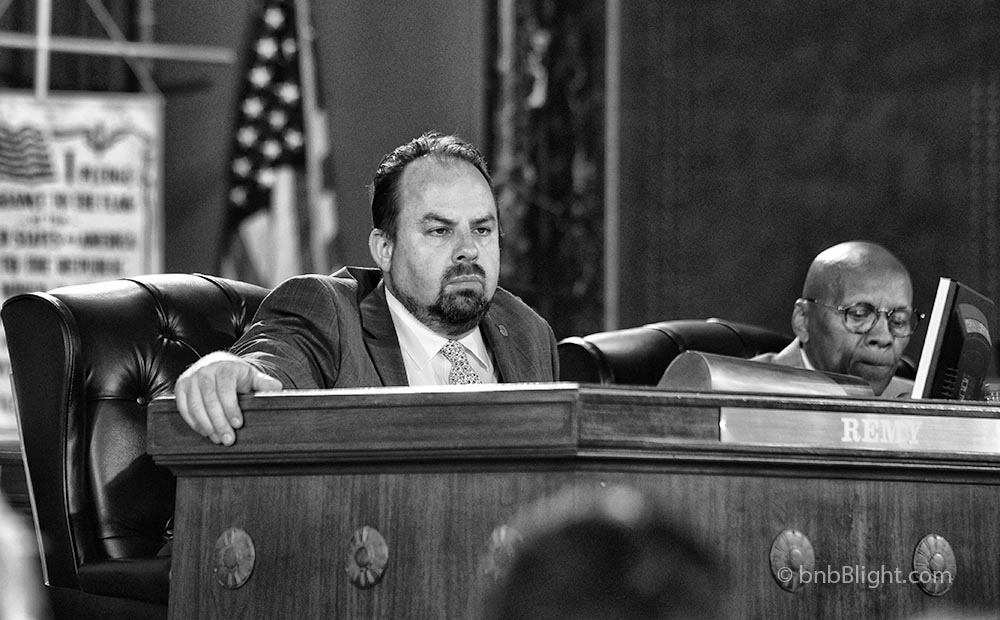 |
|
Realtor Emmanuel Remy - Click to enlarge |
|
Columbus Realtors - When there is upheaval in the real estate market who benefits? Realtors. Sure, they may look like they care about your local area by sponsoring your daughter's softball team, but this group brought an enormous number of people into the City Council hearings to support "no regulations" for short-term rentals. To make matters even worse for Columbus residents, City Council member, Emmanuel Remy, is a realtor in Columbus, and he actively campaigned for this legislation (or lack thereof). He was asked by a Columbus resident to step aside and not vote for this legislation because of his conflict of interest. He voted anyway and he voted "yes".
Hotel / Motel Industry - It is odd to include this industry among the winners, but little do people know that the Hotel/Motel industry is getting into the short-term rental business as well. Several popular brands are either offering or are testing this concept. These hotel chains include: Marriott, Hyatt, and AccorHotels.
Losers
Columbus City Residents - Us. Columbus City Council has chosen to place visitors to Columbus above its own residents, tax payers, and voters. It was absolutely a no-brainer for City Council to follow the lead of other U.S. cities and ban non-owner occupied Airbnb's. It is extremely puzzling how the Columbus City Council does follow the lead set by other Midwestern cities on a wide range of issues, but went a completely different direction with non-owner occupied short-term rentals. If the Columbus Dispatch could do its job (see below), perhaps Columbus residents will eventually find out what went wrong with this Council decision.
Prospective Home Buyers - In many cases, these are lower priced homes that are perfect for younger families that do not have a substantial amount of credit history. Corporations are snapping up these homes using their lines-of-credit to make these a “cash” transaction that requires no contingencies and no financial credit checks. These younger families will have to pay more or go without. Columbus is one of the hottest real-estate markets in the United States so this legislation could not have come at a worse time for prospective home buyers.
Prospective Renters - The Democrats in City Council appear to care a great deal about renters by making it difficult for property owners to evict them. Now property owners will convert a portion of their rental units into Airbnb's in order to: avoid tenant laws, reduce the number of rental units, and drive up the price of regular rentals. While the City Council has pledged to allocate a percentage of the motel tax to low income housing, this is window-dressing to cover up a problem that City Council is making worse.
Columbus Dispatch - The Columbus Dispatch did a miserable job of covering this legislation. They fell hook-line-and-sinker for the Airbnb propaganda about the benefits of the “sharing economy” while being completely oblivious to how Airbnb's engine for growth is "corporations invading residential neighborhoods". They also ignored how the momentum in most leading cities has changed from embracing Airbnb's to banning them, especially non-owner occupied short-term rentals. Many people subscribe to the Dispatch for their local news coverage. This was an epic failure for the Dispatch and for the uninformed Columbus residents.
Neighborhoods Undergoing Gentrification - Neighborhood gentrification should be a hot-button issue for the Democratic-controlled Columbus City Council just as it is in all major cities. It was not for the Columbus City Council. This single issue should be reason enough to ban non-owner occupied Airbnb's. Since motel guests are largely unaware of the condition of questionable neighborhoods, investors will purchase these homes, put a few dollars into them to make them look acceptable in online photos, and rent them via Airbnb. Bam. Another affordable home is no longer available for purchase or for rent.
Columbus Government Finances - Very little has been discussed about this, but as residents are pushed outside of Columbus, they will no longer be paying city incoming tax. Tax paying citizens will be replaced by visitors. While both short-term rentals and hotels/motels will be on similar footing by paying a 10% motel tax, it is still unclear if short-term rentals will be paying the 7.5% sales tax that hotels/motels must pay.
So that's it in a nutshell.. The Columbus City Council simply cares more about city visitors, short-term rental companies (i.e. Airbnb), and an extremely vocal and organized group of "hosts", instead of its own residents, voters, and tax payers.
![]()
![]()
TUESDAY, JUNE 26, 2018
The Current Situation in Columbus, Ohio..
You purchased a nice home in a quiet residential neighborhood. You’ve lived there for years, maybe decades. You like your neighbors. You like your neighborhood. You know your neighbors by name, and you even know your neighbors’ dogs’ names. Then..
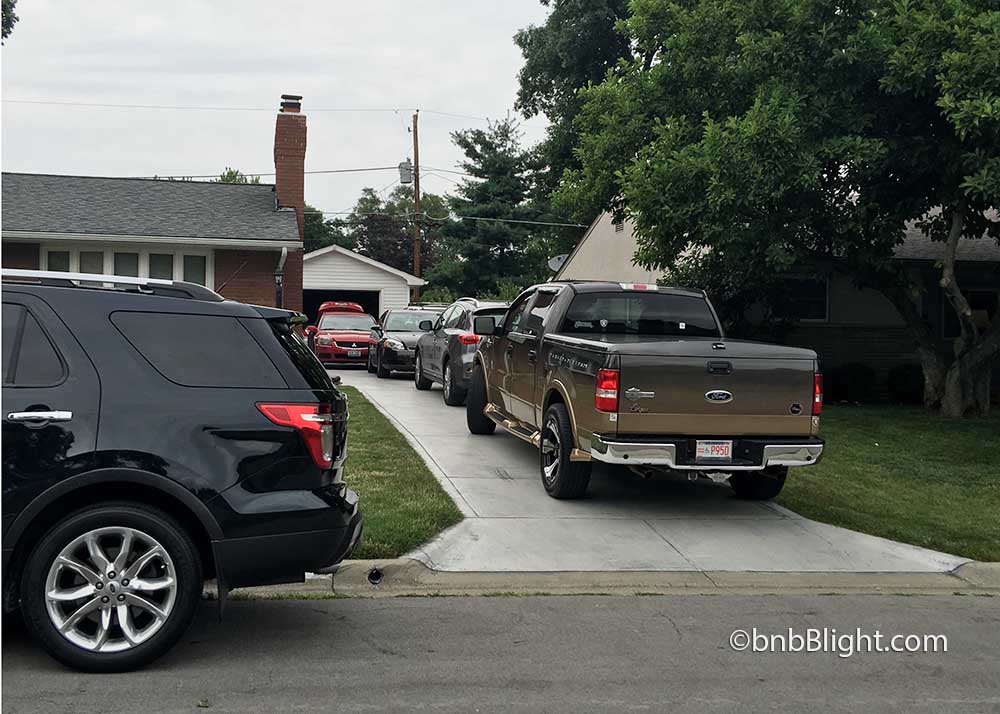 |
|
Having a motel next door - Click to enlarge |
|
Wait. What? How can a motel be brought into a residential neighborhood? Your neighborhood is zoned residential. You can’t have bakeries, coffee shops, or hair salons next door to you, but now you can have a full-time motel? This can't be right. But people who are out to make a quick buck think it is a great idea.
If you have ever stayed in a motel, you already know what it is like to live by an Airbnb motel. Car doors slam. Car door remotes beep. Late night arrivals. Early morning departures. Yes, just like a motel. But now, it is next door to you. Next door to your home.
It is also far more than just the noise. It is that there are strangers in the neighborhood. When a really bad thing happens, one of the first things that police do is to investigate what workers were recently brought into a neighborhood for roofing, roadwork, etc. These workers are not always well vetted and some are bad people who look for prey wherever they go. How many motel guests, who can now watch your family in your own backyard, have evil intent? No one knows. These people, however, can quickly find out who you are, while you have no idea who they are. Click Permanent Airbnb-like Motels for a potential tool to monitor these motel guests.
More Regulations Passed
The residents in many cities, including in Airbnb’s home city of San Francisco, are fighting back with tough regulations on this latest get-rich-quick scheme.
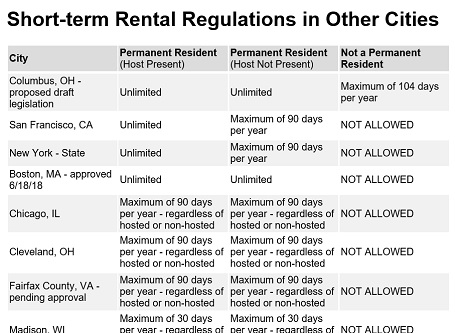 |
|
STR Regulations in Other Cities - Click to view table |
|
The big question is "Why would Columbus City Council consider starting with a policy that is far more lenient than what other cities have?" These are high-tech cities that are more experienced in dealing with Airbnb's business practices. Why isn't Columbus learning from them? Does Columbus City Council care more about visitors to the city or its residents (and voters)?
Recent News Articles
Just as other city governments are more up-to-speed on short-term rental issues, their cities' news coverage is as well. Click on this link (or in the above dropdown menu) to view a number of recent, insightful articles (and bnbBlight's comments about the articles). Many of these articles, and more, will be re-Tweeted in the bnbBlight.com Twitter feed. This Twitter feed is also included on the right-side navigational bar above.
Columbus Association of Realtors
You would think that the friendly leaders of the Columbus Association of Realtors would be strongly against this invasion into residential neighborhoods. But no. They are “for” it. Do they think it will cause an upheaval in neighborhoods which gives them more business? Maybe they will list your home for sale for a price that is too low so that they or their friends can swoop in and buy it immediately for use as a short-term rental?
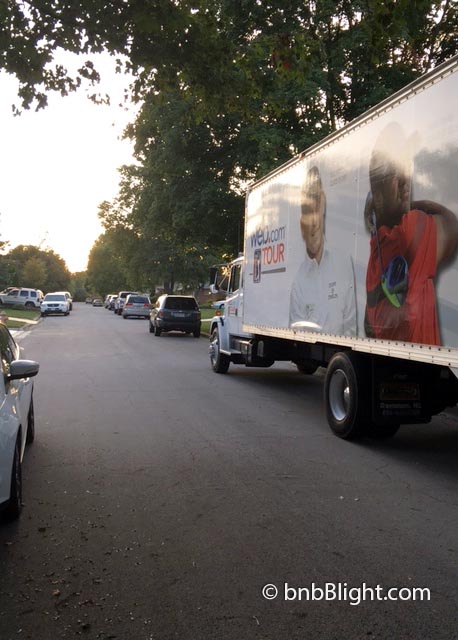 |
|
Street Parking - Click to enlarge |
|
Think of the math. When a home becomes a motel, it can negatively affect at least eight other homes - the three in front, the three in back, and the two homes to each side. It is a domino effect that benefits the realtors because some of these owners will flee to the suburbs that do not permit motels in residential areas. These realtors might get more business when these home owners flee. It is odd when homes are practically selling themselves at above list prices that the leadership of the Columbus Realtors would take a position that is directly counter to their customers' best interests. No young family would want to live next door to an Airbnb-like motel.
At a minimum, realtors should be forced to disclose the Airbnb-like motels in the surrounding area. They should also be forced to disclose whether the house that is being sold was an Airbnb-like motel.
Click to read Columbus Realtor President-Elect John Myers' statement at the Columbus City Council Hearing on June 14.
For those realtors who are pro-neighborhood and who are against non-owner occupied full-time Airbnb motels, bnbBlight.com will offer free publicity. Enter a Feedback to request to be included on this list.
As a side note, it is always been confusing how the realtor business has remained as strong as it is when no one uses a travel agent to plan for a trip and no one buys stocks via a broker anymore. Car purchasing is even going online. It is surprising that Amazon or an Amazon-like service has not completely disrupted this business and driven the percentages through the floor. If you think your neighborhood's well-being is at odds with the realtors in your area, there is always 4SaleByOwner, Owners.com, and Zillow.
And What Happens When...
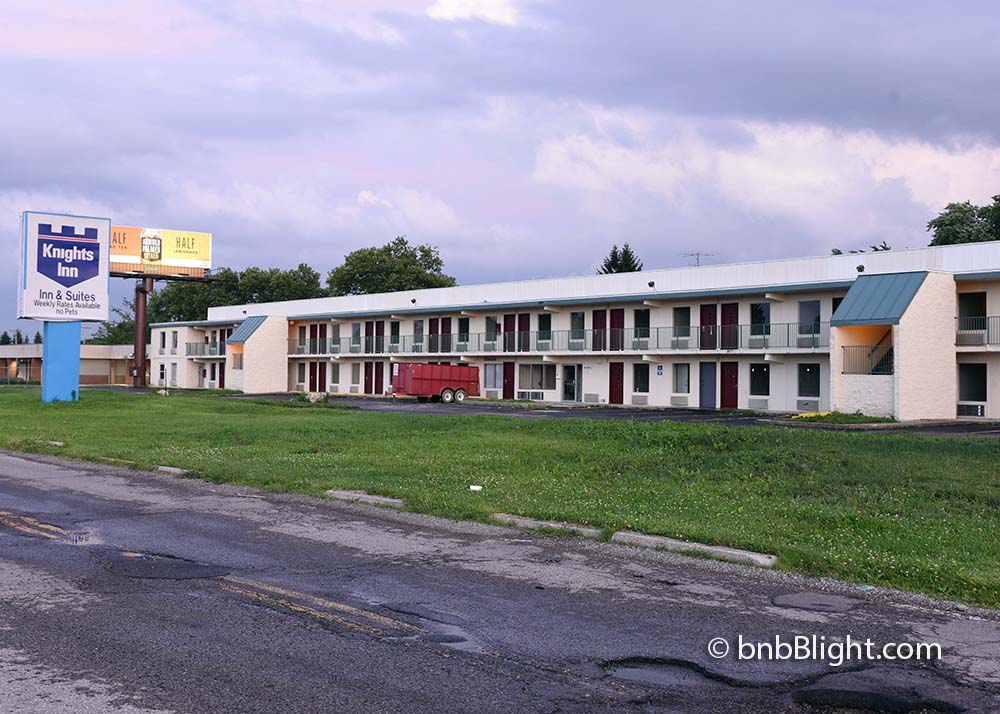 |
|
STRs during the next recession? - Click to enlarge |
|
The economy is on fire and people are traveling en masse. This will not continue and this latest get-rich-quick scheme will not either. The room rates that these Airbnb motel owners charge per night will start coming down. Some will hold off on dropping the price until they realize that some money, any money is better than no money, but the people who did spend $149 per night are often very different than those who will only spend $49 per night. How many of these new "motel" owners worked in the motel-hotel industry during the last recession? Marriott's stock price is $139 now - during the depth of the recession it was $13.
And when the Airbnb motel owners can no longer pay their mortgage, what happens to your neighborhood? You get bnbBlight..
What's Next?
If you think your Columbus neighborhood is immune to this problem, then you are wrong. The house next door to you could become an Airbnb-motel. Enter a Feedback to get on the bnbBlight.com mailing list.
Disclaimer:
The content of this website is furnished for general information and prototype purposes only at this time. It is subject to change without notice, and should not be construed as a commitment of current or future services by bnbBlight.com. You should not rely upon the material or information on the website as a basis for making any business, legal or any other decisions. bnbBlight.com assumes no responsibility or liability for any errors or inaccuracies that may appear in the content of this site,and is unable to take responsibility for any actions you may take as a result of your use of the information contained herein.
bnbBlight.com provides this website without warranty, term, or condition of any kind, either implied or expressed, including, but not limited to, the implied warranties, terms or conditions of merchantability, satisfactory quality, and fitness for a particular purpose. bnbBlight.com its employees and agents will not be responsible for any loss, however arising, from the use of, or reliance on this information.
All information, graphics, designs and site content are the exclusive property of bnbBlight.com. No portion of this website, in whole or in part, may be used without the express written consent of bnbBlight.com.
Privacy-Related Information: Google tracking is used on this site. Google uses "cookies" to identify your browser for use in serving ads and tracking your activity. For more information, please visit their respective sites. Please refer to your browser's help files if you wish to alter your privacy settings.
